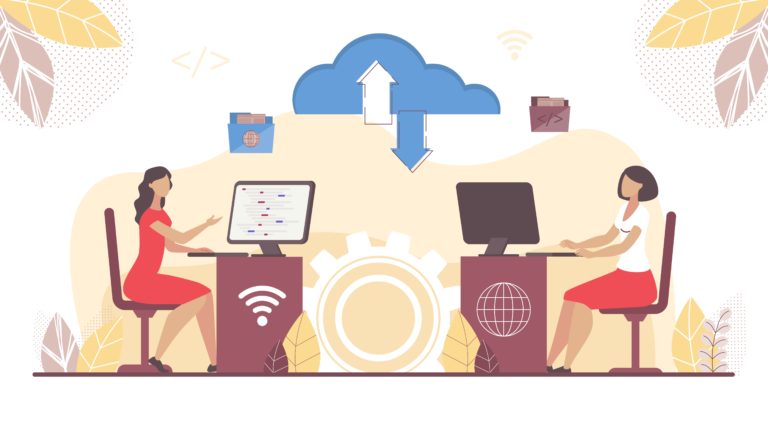In recent years, the convergence of e-commerce and blockchain technology has emerged as a powerful catalyst for economic growth. As businesses and consumers increasingly embrace digital commerce, blockchain provides a robust foundation for enhancing security, transparency, and efficiency across the entire e-commerce ecosystem.
By offering decentralized solutions to traditional problems like fraud, payment delays, and supply chain inefficiencies, blockchain is transforming e-commerce into a more secure and streamlined industry. This blog explores how blockchain is driving economic growth by reshaping e-commerce and creating new opportunities for businesses, consumers, and entire economies.
As blockchain technology continues to mature, its potential to revolutionize the way goods and services are bought, sold, and delivered is becoming more evident. From enhancing cross-border payments to improving supply chain visibility, blockchain has the capacity to address key challenges faced by e-commerce businesses.
By reducing costs, increasing trust, and opening new avenues for innovation, blockchain is creating a dynamic environment that is fostering economic growth globally.
Enhancing Efficiency in E-commerce Transactions
One of the most significant ways blockchain is driving economic growth in e-commerce is through the enhancement of transaction efficiency. Traditional payment systems often involve intermediaries, leading to delays, additional fees, and potential security risks.
Blockchain eliminates the need for intermediaries by enabling direct peer-to-peer transactions through smart contracts. These self-executing contracts automatically enforce the terms of an agreement without the need for a third party, making transactions faster, cheaper, and more secure.
For businesses, this means fewer transaction fees and reduced administrative costs, directly boosting profitability. Consumers also benefit from quicker payments and greater convenience.
Additionally, the decentralized nature of blockchain reduces the risk of fraud and chargebacks, which has long been a problem in online retail. With faster, cheaper, and more secure transactions, e-commerce businesses can operate more efficiently, contributing to overall economic growth.
Facilitating Cross-Border Trade and Payments
Cross-border trade has long been a key driver of global e-commerce growth. However, the complexities of international payments, including high fees, fluctuating exchange rates, and long processing times, have hindered its potential.
Blockchain addresses these challenges by providing a transparent, low-cost, and fast alternative to traditional cross-border payment systems. By using cryptocurrencies or blockchain-enabled platforms, e-commerce businesses can facilitate seamless, borderless transactions that avoid the traditional hurdles of currency conversion and international banking systems.
Blockchain’s role in simplifying cross-border payments has a profound impact on global trade, enabling businesses in emerging markets to access international customers more easily. Small and medium-sized enterprises (SMEs), often excluded from international commerce due to high transaction costs, can now participate more actively in the global market.
This expansion of cross-border trade not only drives the growth of individual businesses but also contributes to the broader economic development of countries participating in the digital economy.
Strengthening Supply Chain Transparency
Supply chain transparency is another area where blockchain is significantly impacting e-commerce. In traditional supply chains, tracking the provenance of products can be difficult, leading to inefficiencies, fraud, and disputes.
Blockchain provides a solution by offering a decentralized, immutable ledger that records every transaction or movement within the supply chain. This allows all stakeholders, from manufacturers to consumers, to track the origin and journey of products in real-time.
For e-commerce businesses, blockchain’s supply chain transparency reduces fraud, ensures product authenticity, and increases operational efficiency. By providing verifiable data on the sourcing of raw materials, labor conditions, and environmental impact, businesses can build trust with customers and enhance their reputation. This, in turn, boosts sales and contributes to economic growth.
Furthermore, blockchain helps businesses optimize their supply chains by providing better visibility into bottlenecks, reducing waste, and improving inventory management, all of which increase profitability and drive growth.
Empowering Consumer Trust and Security
Trust and security are critical components of any successful e-commerce business. Blockchain’s transparent and immutable nature fosters consumer trust by ensuring the integrity of transactions and data.
Unlike traditional systems, where data can be manipulated or tampered with, blockchain records transactions in a secure and unalterable ledger. This increases consumer confidence in online shopping, especially when it comes to sensitive information like payment details and personal data.
Additionally, blockchain’s decentralized nature means that businesses are less vulnerable to data breaches and cyberattacks, which can severely damage an e-commerce company’s reputation and financial standing.
By offering a more secure and trustworthy platform, blockchain helps attract more consumers, thereby increasing sales and contributing to overall economic growth. As trust in e-commerce platforms grows, more consumers are likely to engage in online shopping, further boosting the digital economy.
Enabling New Business Models and Innovation
Blockchain-based payment solutions also opens the door for new business models and innovative solutions that can drive economic growth. For example, blockchain enables decentralized marketplaces, where buyers and sellers can transact directly without intermediaries. This reduces fees, increases competition, and provides a more equitable platform for businesses, particularly small players who may not have the resources to compete in traditional centralized systems.
Furthermore, blockchain supports the growth of token-based economies, where companies can create their own digital tokens for rewards, loyalty programs, or governance. These tokens can incentivize customer behavior, such as referrals or reviews, while also giving businesses a way to directly engage with their customers.
The ability to create new revenue streams and innovative business models fosters creativity and encourages entrepreneurial ventures, ultimately contributing to economic growth.
Blockchain Adoption Trends in E-commerce Across Regions
Blockchain technology has become a game-changer in many sectors, and e-commerce is no exception. With its ability to enhance transparency, security, and efficiency in transactions, blockchain is rapidly transforming how online businesses operate.
As global e-commerce continues to expand, different regions are adopting blockchain technology at varying paces, influenced by factors such as economic conditions, regulatory environments, and technological infrastructure. This article examines the trends of blockchain adoption in e-commerce across different regions and how these trends are shaping the industry.
From the United States and Europe to Asia and Africa, the application of blockchain in e-commerce is being embraced differently, depending on local needs and opportunities. While some regions are leading the way with large-scale implementations, others are still in the early stages of exploring its potential.
The following sections will highlight regional differences, providing a clear picture of how blockchain is poised to reshape the global e-commerce landscape.
North America: Leading the Way with Innovation
In North America, particularly in the United States and Canada, blockchain adoption in e-commerce has been marked by a high level of innovation and investment. These countries are home to many technology-driven businesses that have quickly recognized blockchain’s potential to streamline supply chains, improve customer trust, and enhance payment systems.
Leading e-commerce platforms, such as Amazon and Shopify, have been exploring blockchain for various applications, including enabling faster, more secure transactions and reducing fraud.
Furthermore, North America’s regulatory environment has played a crucial role in encouraging blockchain adoption. Governments in these countries have been relatively open to blockchain innovation, though they continue to work on establishing clearer frameworks to ensure its safe and effective use.
Blockchain-based payment systems, such as cryptocurrency integration and smart contracts, have gained traction among online merchants in the region. In particular, blockchain allows merchants to bypass traditional banking systems, reducing transaction fees and processing times.
Europe: Regulatory Support and Industry Collaboration
Europe has been another strong adopter of blockchain technology, largely due to favorable regulations and collaborative initiatives within the e-commerce industry.
The European Union has taken proactive steps to support blockchain innovation, with initiatives like the European Blockchain Partnership aimed at creating a regulatory framework for cross-border digital services. The EU has shown particular interest in blockchain’s ability to address data security, consumer protection, and supply chain transparency.
In Europe, e-commerce platforms are increasingly implementing blockchain for ensuring product authenticity, improving inventory management, and offering enhanced customer experiences. The adoption of blockchain in e-commerce transactions, particularly through the use of digital identities and smart contracts, has been gaining momentum.
Blockchain’s capacity to securely store data and facilitate frictionless transactions has made it highly attractive for businesses looking to comply with stringent data protection laws, such as the General Data Protection Regulation (GDPR). As a result, European e-commerce businesses are leveraging blockchain to meet these regulatory requirements while simultaneously improving operational efficiency.
Asia: Blockchain for Expedited Payments and Logistics
Asia, with its vast and diverse e-commerce market, is also a key player in the adoption of blockchain technology. Countries like China, Japan, South Korea, and India are leading the way in exploring how blockchain can streamline supply chains, improve cross-border payments, and enhance logistical operations.
In China, for example, e-commerce giants like Alibaba and JD.com have already integrated blockchain to improve their supply chain management and ensure product quality.
In Japan and South Korea, blockchain adoption is primarily focused on enabling faster and cheaper payments for online shoppers and merchants. Cryptocurrency adoption, specifically Bitcoin and Ethereum, is higher in these countries, making blockchain an ideal solution for reducing transaction fees associated with traditional banking systems.
Blockchain-based cross-border payments are also gaining popularity in India, as they offer a more affordable alternative to conventional remittance systems. With Asia being home to some of the largest e-commerce platforms globally, blockchain’s integration into payment and logistics systems is expected to drive further growth and innovation in the region.
Middle East and Africa: Emerging Potential for Blockchain
In the Middle East and Africa, blockchain adoption in e-commerce is still in its nascent stages, but the potential for growth is substantial. Countries in the Middle East, such as the UAE and Saudi Arabia, are at the forefront of blockchain exploration.
The UAE, in particular, has implemented a national strategy to adopt blockchain for various sectors, including government services and financial transactions. While e-commerce is not yet as developed in these regions as in North America or Europe, blockchain’s ability to simplify payments, enhance transparency, and reduce fraud is beginning to gain attention.
In Africa, blockchain adoption is driven by the need for more secure, efficient, and cost-effective solutions in cross-border payments and mobile transactions. Blockchain technology has the potential to overcome many of the financial barriers faced by e-commerce businesses and consumers in Africa.
The ability to reduce the reliance on traditional banking infrastructure makes blockchain a perfect fit for the continent, where mobile payments are already widely used. As more African countries develop their digital economies, blockchain is expected to play a key role in facilitating e-commerce growth.
Latin America: Blockchain for Financial Inclusion and Supply Chain Transparency
In Latin America, blockchain adoption is rapidly gaining traction, particularly for enhancing financial inclusion and ensuring supply chain transparency. Countries such as Brazil, Mexico, and Argentina are seeing increasing interest in blockchain applications within the e-commerce sector.
Latin America’s economic challenges, including inflation and banking inefficiencies, have made blockchain an attractive solution for improving financial transactions and ensuring secure, transparent business operations.
Blockchain-based payments and cryptocurrencies using top blockchain-based payment solutions are gaining popularity in the region as they offer a reliable alternative to traditional banking systems. E-commerce businesses in Latin America are integrating blockchain to streamline payment systems, reduce fraud, and make cross-border transactions more affordable.
Additionally, blockchain is being used to ensure the integrity of the supply chain, providing customers with verifiable information about the origin of products, thus increasing trust in online transactions.








